Book1_Unit2
(完整版)全新大学英语第二版BOOK1-UNIT2教案

Teaching Plan of Unit 1, Book 1FriendshipText A All the Cabbie Had Was a LetterTeaching Objectives:Students will be able to1.grasp the main idea (never delay expressing your true feelings to a friend) and structure of Text A(developing a story around a letter);2.appreciate characteristic features of spoken English as demonstrated in Text A (spoken English ismuch more informal than written English);3.master the key language points in Text A and learn how to use them in context;4.understand the cultural background related to the content;5.express themselves more freely on the theme of Friendship after doing a series of theme- relatedreading, listening, speaking and writing activities;6.Write a personal letter in an appropriate way.Time Allotment:4-5 class hoursTeaching Methodology: student-centered; group work, pair workTeaching Procedures:I. Pre-reading tasks1. Think- pair-share: Ask students to brainstorm proverbs about friendship.Suggested answers:Friends are like the stars on a cloudy night. You can't always see them, but they are there. Friendship cannot stand always on one side.Between friends all is common.False friends are worse than open enemies.A friend to all is a friend to none.The friendship that can end was never real.A friend is easier lost than found.A friend in need is a friend indeed.Friends are like wine; the older, the better.Good company on the road is the shortest cut.True friendship is like sound health; the value of it is seldom known until it is lost.Ask students to choose the proverb they like best and give reasons.2. Survey--- Do you often write letters to your friends?Question and answer: Which do you think is the best way in expressing our innermost feelings?II. Text Learning:Task 1: Topic-related PredictionWhat does a cabbie do?What is a letter used for?Who wrote the letter to the cabbie?Why was all the cabbie had only a letter?Task 2: Scanning (see PPT)Scan Text A and decide which of the following statements is the theme.1. One should keep in touch with his friends.12. Never delay expressing your true feelings to a friend.3. A true friend will stand by you forever.4. Late is better than never.Task 3: Group work: Divide the text into smaller parts and assign them to different groups. Ask the students to work in groups and do the following:▪Step 1: Read the assigned part, and try to understand its meaning.▪Step 2: Ask and tell each other about the difficulties in understanding this part.▪Step 3: Make a list of useful words and phrases.▪Step 4: Choose one member to make a short report to the class.Task 4: Language study1) T leads the students’ attention to the colloquial sentences:▪Go ahead and finish your letter.▪I’m not much of a hand at writing.▪We were kids together, so we go way back.▪You kind of lose touch even though you never forget.▪It’s no fun to lose any friend.2) Study the language points and practice them.be lost in; available; go ahead; know\ learn by heart; estimate; might as well\ may as well;keep up; correspondence; practically; neighborhood; kind of\ sort of; lose touch with; come up;urge; postpone; reference; absolutely; reunion; hang out; every now and then; choke up;destination; skip; right away3) Game: Flash Cards (Vocabulary Activity)After practicing the above, ask Ss to work in pairs▪Step 1: Through discussion, delete those they have already grasped.▪Step 2: Divide the rest of the words and phrases into two groups, and each student will be deal with one of the group. Write down the words and phrases on cards ( one on each card). Find out their English explanations, and write them down on the back of the corresponding cards.▪Step 3: Practice: One gives the explanation, and the other guesses the word or phrase.▪Step 4: Ss exchange roles and go on practicing.▪III. Post-reading activities:1. Dictogloss (an activity that combines elements such as dictation, cooperation, oral practice and grammar etc.):Step 1: T prepares a paragraph either related to the topic or a grammar item, writes down the difficult words on the board if there are any;Step 2: First listening: Ss are required to listen only, without writing anything;Step 3: Second reading: Ss are required to write down the key words, without worrying about the spelling mistakes;Step 4: Ss work in groups to reconstruct the article, trying to write down every sentence with correct spelling and sentence structure.Step 5: Ask Ss to write what they have got on a big piece of paper, or share with the class orally; Step 6: T shows the original text, comments on what the students have done and explains the grammar points.22. Writing:Directions: Write a letter (at least 120 words) to your best friend, following the outline given below:1)Your feeling about your new life in the university;2)How you miss him\ her and the time you had together.3)Inviting him\ her to pay you a visit.3. Suggested song: Cry on my shoulder4. Suggested movie: Mary and Max3。
book1Uint2课件

Revision:将下列词组或短语翻译成中文或英语。
get/be married 1. 结婚 ____________________________ horse riding 2. 骑马 ______________________________ compete for 3. 为了……而竞赛______________________ as well 4. 也__________________________________ be in charge of 5. 负责……,管理……____________________ promise sb. to do sth. 6. 答应某人做某事______________________ every other day 7. 每隔一天____________________________ in high spirits 8. 情绪高涨____________________________ change one’s mind 9.改变主意_____________________________ used to do sth. 10. 过去经常做某事_______________________
B 29. Being able to afford _______ drink would be ______ comfort in those tough times. (山东) • A. the; the B. a; a • C. a; 不填 D. 不填;a 21.The Smiths don’t usually stay at hotels, but last summer they spent a few days at a very C nice hotel by ________ sea(江西) • A./; a B.the; the C./; the D.the; a • 总结: • 单项选择题考点涉及高中阶段许多重要的语法项 目,如时态语态,从句,非谓语动词等。不避重 难点,突出考察情景。
book1课后练习答案unit 2
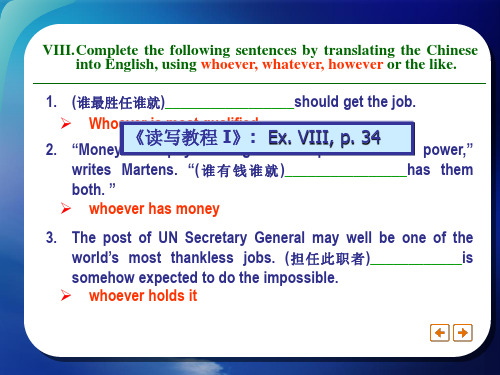
plete the following sentences by translating the Chinese into English, using whoever, whatever, however or the like.
3. Mr. Miller thinks that ( 谁不跟他在一起谁就 )____________is against him. whoever is not with him
《读写教程 I》: Ex. VIII, p. 34
3. The post of UN Secretary General may well be one of the world’s most thankless jobs. ( 担任此职者 )____________is somehow expected to do the impossible. whoever holds it
simply startle relative fall apart
5. I agree with you that men and women should be equally _____ for bringing up children. responsible 6. Now that their children have all begun to work, the Browns are living in _____ comfort. relative
4. He knew these files could be of help to (任何将要担任这项工作 的人)______________. whoever would take the job 5. (谁害怕正视自己的过去谁就)______________will fear what is to come Whoever fears to face his own past
人教版(2019)必修第一册Unit2TravellingAround单元词汇与话题写作(含答案)
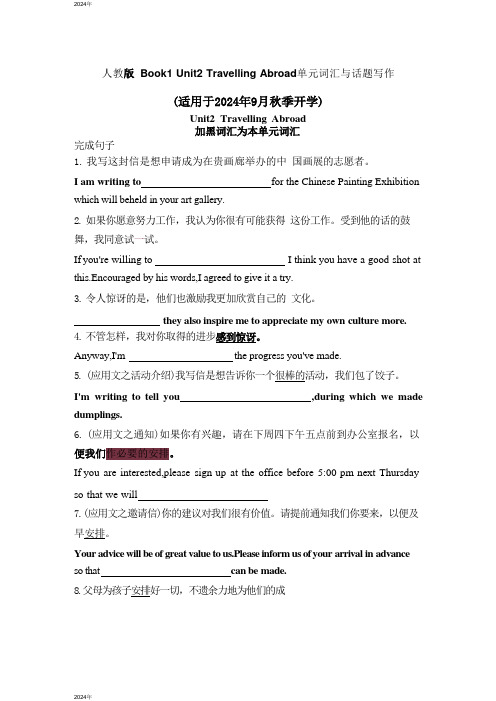
人教版Book1 Unit2 Travelling Abroad单元词汇与话题写作(适用于2024年9月秋季开学)Unit2 Travelling Abroad加黑词汇为本单元词汇完成句子1. 我写这封信是想申请成为在贵画廊举办的中国画展的志愿者。
I am writing to f or the Chinese Painting Exhibition which will beheld in your art gallery.2. 如果你愿意努力工作,我认为你很有可能获得这份工作。
受到他的话的鼓舞,我同意试一试。
If you're willing to I think you have a good shot at this.Encouraged by his words,I agreed to give it a try.3. 令人惊讶的是,他们也激励我更加欣赏自己的文化。
they also inspire me to appreciate my own culture more. 4. 不管怎样,我对你取得的进步感到惊讶。
Anyway,I'm t he progress you've made.5. (应用文之活动介绍)我写信是想告诉你一个很棒的活动,我们包了饺子。
I'm writing to tell you ,during which we made dumplings.6. (应用文之通知)如果你有兴趣,请在下周四下午五点前到办公室报名,以便我们作必要的安排。
If you are interested,please sign up at the office before 5:00 pm next Thursday so that we will7.(应用文之邀请信)你的建议对我们很有价值。
请提前通知我们你要来,以便及早安排。
Your advice will be of great value to us.Please inform us of your arrival in advance so that c an be made.8.父母为孩子安排好一切,不遗余力地为他们的成功铺平道路。
book1 unit2重点
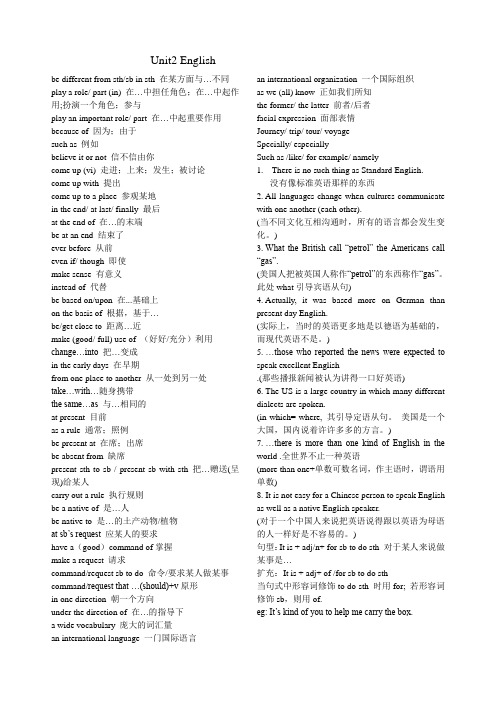
Unit2 Englishbe different from sth/sb in sth 在某方面与…不同play a role/ part (in) 在…中担任角色;在…中起作用;扮演一个角色;参与play an important role/ part 在…中起重要作用because of 因为;由于such as 例如believe it or not 信不信由你come up (vi) 走进;上来;发生;被讨论come up with 提出come up to a place 参观某地in the end/ at last/ finally 最后at the end of 在…的末端be at an end 结束了ever before 从前even if/ though 即使make sense 有意义instead of 代替be based on/upon 在...基础上on the basis of 根据,基于…be/get close to 距离…近make (good/ full) use of (好好/充分)利用change…into 把…变成in the early days 在早期from one place to another 从一处到另一处take…with…随身携带the same…as 与…相同的at present 目前as a rule 通常;照例be present at 在席;出席be absent from 缺席present sth to sb / present sb with sth 把…赠送(呈现)给某人carry out a rule 执行规则be a native of 是…人be native to 是…的土产动物/植物at sb’s request 应某人的要求have a(good)command of掌握make a request 请求command/request sb to do 命令/要求某人做某事command/request that …(should)+v原形in one direction 朝一个方向under the direction of 在…的指导下a wide vocabulary 庞大的词汇量an international language 一门国际语言an international organization 一个国际组织as we (all) know 正如我们所知the former/ the latter 前者/后者facial expression 面部表情Journey/ trip/ tour/ voyageSpecially/ especiallySuch as /like/ for example/ namely1.There is no such thing as Standard English.没有像标准英语那样的东西2. All languages change when cultures communicate with one another (each other).(当不同文化互相沟通时,所有的语言都会发生变化。
高中英语2019新教材必修一unit2travelling around单词
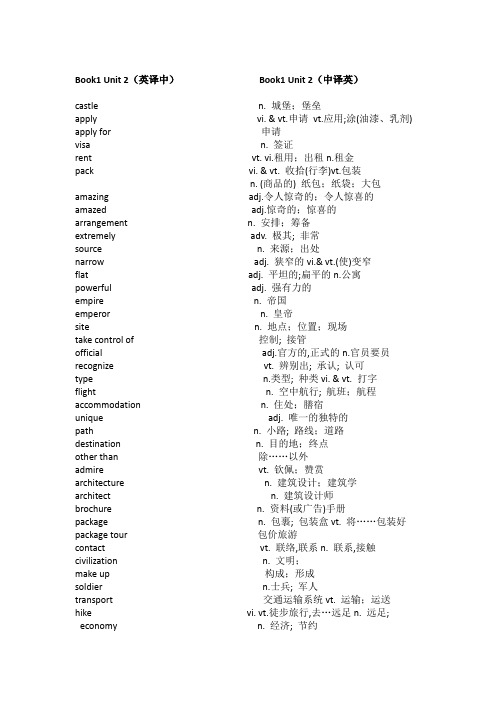
Book1 Unit 2(英译中)Book1 Unit 2(中译英)castle n. 城堡;堡垒apply vi. & vt.申请vt.应用;涂(油漆、乳剂) apply for 申请visa n. 签证rent vt. vi.租用;出租n.租金pack vi. & vt. 收拾(行李)vt.包装n. (商品的) 纸包;纸袋;大包amazing adj.令人惊奇的;令人惊喜的amazed adj.惊奇的;惊喜的arrangement n. 安排;筹备extremely adv. 极其; 非常source n. 来源;出处narrow adj. 狭窄的vi.& vt.(使)变窄flat adj. 平坦的;扁平的n.公寓powerful adj. 强有力的empire n. 帝国emperor n. 皇帝site n. 地点;位置;现场take control of 控制; 接管official adj.官方的,正式的n.官员要员recognize vt. 辨别出; 承认; 认可type n.类型; 种类vi. & vt. 打字flight n. 空中航行; 航班;航程accommodation n. 住处;膳宿unique adj. 唯一的独特的path n. 小路; 路线;道路destination n. 目的地;终点other than 除……以外admire vt. 钦佩;赞赏architecture n. 建筑设计;建筑学architect n. 建筑设计师brochure n. 资料(或广告)手册package n. 包裹; 包装盒vt. 将……包装好package tour 包价旅游contact vt. 联络,联系n. 联系,接触civilization n. 文明;make up 构成;形成soldier n.士兵; 军人transport 交通运输系统vt. 运输;运送hike vi. vt.徒步旅行,去…远足n. 远足; economy n. 经济; 节约economic adj. 经济(上)的; 经济学的credit n. 借款;信用; 称赞; 学分credit card 信用卡detail n. 细节;详情check in (在旅馆、机场等) 登记check out 结账离开(旅馆等)request vt /n. (正式或礼貌的)要求;请求view n. 视野;景色;看法sight n. 景象; 视野; 视力statue n.雕塑;雕像BCE (=before the Common Era) 公元前tomb n. 坟墓unearth vt. 挖掘;发掘comment n. vi.& vt.议论;评论Book1 Unit 2 travelling around单词原版带音标castle /ˈkɑ:sl/ n. 城堡;堡垒apply /əˈplaɪ/ vi. & vt.申请;请求vt. 应用; 涂(油漆、乳剂)apply for申请visa /ˈvi:zə/ n. 签证rent / rent/ vt.租用;出租vi.租用;租金为n.租金pack /pæk/ vi. & vt. 收拾(行李)vt.包装n. (商品的) 纸包;纸袋;大包amazing /əˈmeɪzɪŋ/ adj.令人惊奇的;令人惊喜的amazed /əˈmeɪzd/ adj.惊奇的;惊喜的arrangement /əˈreɪndʒmənt/ n. 安排;筹备extremely /ɪkˈstri:mli / adv. 极其; 非常source /sɔ:s/ n. 来源;出处narrow /ˈnærəʊ/ adj. 狭窄的vi.& vt.(使)变窄flat /flæt /adj. 平坦的; 扁平的n. 公寓; 单元房powerful /ˈpaʊəfl / adj. 强有力的;有权势的;有影响力的empire /ˈempaɪə(r)/ n. 帝国emperor / ˈempərə(r)/ n. 皇帝site /saɪt / n. 地点;位置;现场take control of 控制; 接管official /ə'fɪʃl/ adj.官方的;正式的; 公务的n. 官员;要员recognise ( NAmE -ize) /ˈrekəgnaɪz/ vt. 辨别出; 承认; 认可type /taɪp/ n.类型; 种类vi. & vt. 打字flight /flaɪt/ n. 空中航行; 航班;航程accommodation /əˈkɒməˌdeɪʃn/ n. 住处;停留处;膳宿unique /juˈni:k/ adj. 唯一的;独特的; 特有的path /pɑ:θ/ n. 小路; 路线;道路destination /ˌdestɪˈneɪʃn/ n. 目的地;终点other than 除……以外admire /ədˈmaɪə(r)/ vt. 钦佩;赞赏architecture /ˈɑ:kɪtektʃə(r) / n. 建筑设计;建筑学architect /ˈɑ:kɪtekt / n. 建筑设计师brochure /ˈbrəʊʃə(r); NAmE broʊˈʃʊr/ n. 资料(或广告)手册package /ˈpækɪdʒ/ n. 包裹; 包装盒vt. 将……包装好package tour包价旅游contact /ˈkɒntækt / vt. 联络;联系n. 联系;接触civilisation ( NAmE -ization) /ˌsɪvəlaɪˈzeɪʃn/ n. 文明;闻名世界make up 构成;形成soldier /ˈsəʊldʒə(r)/ n.士兵; 军人transport / ˈtrænspɔ:t/ n.(especially BrE)(NAmE usually transportation)交通运输系统vt. 运输;运送hike / haɪk /vi. 徒步旅行vt. 去……远足n. 远足; 徒步旅行economy /ɪˈkɒnəmi/ n. 经济; 节约economic /ˌi:kəˈnɒmɪk/ adj. 经济(上)的; 经济学的credit /ˈkredɪt/ n. 借款;信用; 称赞; 学分credit card 信用卡detail /ˈdi:teɪl / n. 细节;详情;细微之处check in (在旅馆、机场等) 登记check out 结账离开(旅馆等)request /rɪˈkwest/ n. (正式或礼貌的)要求;请求vt.(正式或礼貌地)要求;请求view / vju:/ n. 视野;景色;看法sight /saɪt/ n. 景象; 视野; 视力statue /ˈstætʃu:/ n.雕塑;雕像BCE /ˌbi: si: ˈi:/ (=before the Common Era) 公元前tomb / tu:m / n. 坟墓unearth / ʌnˈɜ:θ/ vt. 挖掘;发掘comment /ˈkɒment/ n.议论;评论vi.& vt. 发表意见;评论。
英语一轮复习book1 unit2
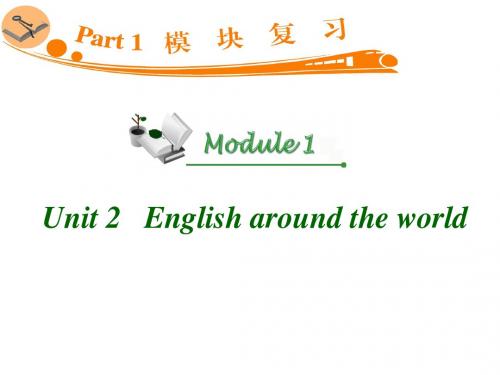
go native 入乡随俗,过当地人的生活
(1)His native musical ability impressed his teacher. 他天生的音乐才能给老师留下了深刻的印象。 (2) The tourists decided to go native. 观光游客们决定过一下本土人的生活。 (3)大熊猫原产于中国。 The giant panda is native to China. (4)作为广州本地人,他对这座城市非常了解。 As a native of Guangzhou, he knows quite well about the city.
像command一样,其后的名词性从句的谓语用 “(should)+动词原形”的常用词有: 一 “坚持 (insist)”; 二 “命令 (order, command)”; 四个“要求 (demand, desire,require, request)”。
四 “建议 (suggest, advise, propose, recommend)”;
=The teacher requested us to finish the survey report within a week.
ask beg
最通俗,最口语化的词 以谦恭的姿态要求给予巨大帮助。
request 客气的请求; demand 强烈请求,要求 require 按照规章条例等要求, (客观)要求,
4. request n. & vt. 请求;要求 注意:sb. request that Sb. +(should )+V(原形) 老师要求我们在一星期内完成这个调查报告。 The teacher requested that we (should) finish
Book1 Unit 2 听力

Unit 2 Travelling AroundListening and SpeakingConversation 1Paul: Hey, Meilin! So what are you doing for the _____________?Meilin: I’m ________ around Europe for two weeks with my aunt and uncle.Paul: Europe? Oh, I’ve always wanted to go there.Meilin: Yes, me, too. I’m so excited. I’m __________ visit France and Germany.Paul: That's wonderful! Do you have your passport and visa already?Meilin: I already have my passport, and I’m _______________ my visa tomorrow. Once I get the visa, we’ll book flight tickets online.Paul: So how do you plan to travel around?Meilin: We _______________ a car and driving! My uncle has always wanted to drive around Europe.Conversation 2Meilin: So what about you, Paul? Do you have any ___________?Paul: Yes, actually! My parents __________ me to Yunnan Province in China to visit Lijiang!Meilin: Lijiang? That' s quite __________ in China.Paul: Yes. One of my father's friends lives there. He invited us to visit.Meilin: Oh, that's nice! So what's the ___________ like there?Paul: It should be pleasant during the day, but it might be cold at night, so I ___________ a few light sweaters and a coat.Meilin: What ______________ to see there?Paul: Well, I know I’m definitely going to see the Old Town of Lijiang and Yulong Snow Mountain. Other than that, I'm not sure. I ______________ a Lijiang guidebook today, actually.Listening and TalkingWoman: Skies Airlines. ___________ can I help you?Man:________________ buy a plane ticket from London to Paris.Woman: Certainly, sir. On ______________ are you travelling?Man: On the 23rd of December.Woman: There are two flights that day: one in the morning at 9:30 and ____________in the afternoon at 5.00. Which do you _________?Man: The 9: 30 flight, please.Woman: Would you like to travel business class or economy?Man:I’d like to travel business class.Woman: Would you like to book a ____________ this time?Man: No, thank you. I’m taking the train back.Woman: __________ have your name, sir?Man:Robert Williams.woman:Thank you, Mr. Williams. I’ve made your____________. May I ask how you would like to pay? Man:By_____________.Woman: OK, wait just a second, please. < Fade out.>*Video Time (选做)Machu PicchuNarrator:This beautiful, quiet place is covered in sunshine and has mountains all around it. Its name s Machu Picchu. It's sometimes _________ the Lost City of the Inca, and it's nearly 8,000 feet up in the Andes. Julio:It's a magic __________that you can feel it here. It's known all over the world that Machu Picchu is one of the magnetic centres of the ancient world .Narrator:Machu Picchu is more than 500 years old. Today, it's a favourite place for visitors from all over the world. Even in the rain and fog, it's ___________ to walk through the ruins When the Inca civilisation ended, few people knew Machu Picchu existed. For a long time it was lost to the outside world. Then, in 1911, an __________ called Hiram Bingham found it.Narrator:At first, very few people visited Machu Picchu. But now, ______________ tourists come here every day. They walk up the steps of the ancient city and climb over the ruins. Machu Picchu is no longer quiet. It's full of the sounds of tourists. Some people in Peru hope that more tourists will come here. They think it will mean more _________ and money for the country. However, some conservationists worry that more visitors won't be good for Machu Picchu. They say that tourism may not be good for the ______________.。
- 1、下载文档前请自行甄别文档内容的完整性,平台不提供额外的编辑、内容补充、找答案等附加服务。
- 2、"仅部分预览"的文档,不可在线预览部分如存在完整性等问题,可反馈申请退款(可完整预览的文档不适用该条件!)。
- 3、如文档侵犯您的权益,请联系客服反馈,我们会尽快为您处理(人工客服工作时间:9:00-18:30)。
IV. Language points
1.available: able to be used,had
e.g.--We have already used up all the available space. . --These tickets are available for one month only. 2.estimate: form a judgment about
e.g.-- I don’t want to urge you against your own wish.
-- We urge that systems be put in place to prevent
such accidents.
11.postpone = put off; delay; suspend; hold up
e.g.-- Let’s postpone making a decision until we have more information. -- They had postponed having children to go abroad. 12. come up: happen; occur; take place; turn up e.g.--Her divorce case comes up next month. --Something new has just come up and I must go and attend to it immediately.
-- I had enough confidence to go ahead.
6.kind/ sort of : a little bit; in some way or degree before verb)
( used
e.g.--The boy’s description kind of gives us an idea of what’s happening. --I kind of thought this would happen. 7.on one’s mind: be troubled about sth e.g.--Dealings on the stock market have been on his mind all the time.
II. Cultural notes
1.Halloween
Halloween is celebrated annually. It is on the night of Oct. 31st, when people once believed that ghosts could be
seen. Now in Britain and America, it is a time when children have parties, dress up as witches, make lanterns out of pumpkins from which the inside has been removed, and play “trick or treat”.The traditional activity means that they will play a “trick”, or joke, on the people in the house unless they are given a “treat”, e.g. sweets or money. Most people prefer to give treats rather than having tricks played on them. [Back]
Paraphrase: But I expect that he is someone that you have known for quite a long time. 17.But I realized that Old Ed was still on his mind when he spoke again, almost more to himself than to me: “ I should have kept in touch. Yes, ” … Paraphrase: But I realize that the taxi driver was still thinking of Old Ed when he spoke again. It seemed that he spoke more to himself than to me: “ I should have written to him regularly. Yes.” He said repeatedly, “ I should have kept in touch with him.” 18.might /may (just) as well e.g.-- Since it is a fine day, we might as well walk. -- Anyway, you’ve here; you might as well stay.
13. hang out: to wait aimlessly in a certain place
e.g.-- Teenagers like to hang out round the square.
14. He must have been completely lost in something because… Paraphrase: He must have been fully occupied with what he was reading because I had to make some noise on the window to draw his attention. 15. “Letters from home always mean a lot,” I said. “ At least they do with me because I’m on the road so much.” Paraphrase: Letters from home are of great value, at least they are of a lot of importance to me because I travel a lot in a car for long distance. 16. “… But I take it he is someone you’ve known quite a
reference book; for further reference
reference to : with reference to = concerning; about
e.g.-- It was strange that he made no reference to any work experience in his resume.
Unit 2
Language Learning
Text A Tips For Learning English
Part 1 Part 2 Part 3 Part 4 Part 5
Objectives Cultural Notes Text Structure Language Points Content Questions
-- With reference to your recent letter, I’m instructed to inform you that we cannot accept the offer. 10.urge: urge sb. to do sth. / into doing sth.
urge that -clause
e.g.--It rained practically everyday. --He says he is practically ruined.
4.correspondence correspondent
correspond with…; corresponding;
e.g.--I have been in correspondence with him about the problem. --Her interest in writing came from a correspondence with a close friend.
I. Objectives
Students will be able to:
1.grasp the main idea (never delay expressing your true feeling to a friend) and structure of the text (developing a story around a letter); 2.appreciate that spoken English is much more informal than written English: short, simple, incomplete, some words /phrases do not usually find their way into written English, shorter paragraph length, sentence length, dialogue, etc.[Back]
III. Text Structure
Parts Paragraphs Main ideas
Part 1 Paras 1-20
From a conversation with the cab driver the author learned how much he regretted failing to keep up correspondence with his old friend Ed. Part 2 Paras 21-35 Reading the letter by himself, the author learned more about the lifelong friendship between the driver and Old Ed. Part 3 Paras 36 The driver’s experience urged the author to reach for his pen.
